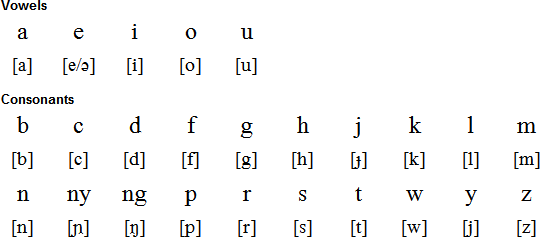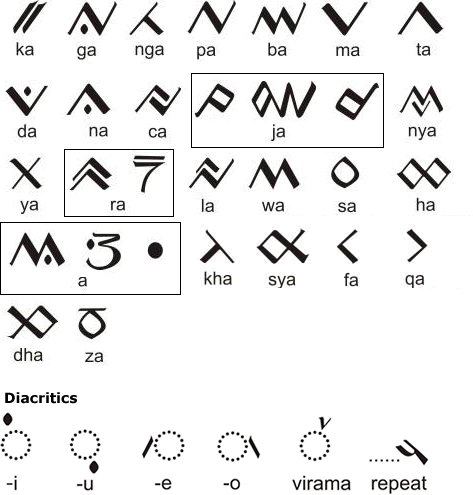Sumbawa is a Malayo-Polynesian language spoken in the western part of Sumbawa island in Indonesia by about 300,000 people. It is also known as Sumbawarese, and is closely related to the languages of Lombok and Bali.
Sumbawa can be written with a version of the Latin alphabet, and also with a script similar to the Bugis script known as Satera Jontal ("palm-leaf manuscript"). This script is still used to some extent, mainly to write poems known as lawas. It has also been taught in schools since 2000.

Source: http://www.ling.hawaii.edu/ldtc/languages/sumbawa/smw Ortography.htm
![]()


Muntu menong ngebang mula, tu barenang tu nti boat. Yaken to mading barapes, tu balangan lalo mesjid, niat tu lalo bejemat, ikhlas ate karna Allah.
When we heard the call of prayer we should stop to working and prepare to go to the mosque to pray on friday sincerely for God.
Information about the Sumbawa language and the Satera Jontal script mainly provided by Ridwan Maulana. If you have any questions about this script, you can contact Ridwan at ridwanmaul768@gmail.com
Information about Sambawa | Numbers
Information about the Sumbawa
https://en.wikipedia.org/wiki/Sumbawa_language
http://www.ethnologue.com/language/smw
https://yogaadiseptiyan.wordpress.com/
http://www.ling.hawaii.edu/ldtc/languages/sumbawa/
http://lingdy.aacore.jp/doc/endangered-scripts-issea/asako_shiohara_paper.pdf
Alorese, Ambai, Ambel, Anuki, Balinese, Bambam, Batuley, Biak, Bima, Bugis, Chamorro, Duri, Enggano, Fijian, Fordata, Gayo, Iban, Javanese, Kei, Komering, Lamaholot, Lampung, Ledo Kaili, Madurese, Makasarese, Mamasa, Mandar, Mandar, Mbula, Mentawai, Mualang, Musi, Ngaju, Nias, Nuaulu, Ogan, Palauan, Sasak, Selaru, Sumbawa, Sundanese, Toqabaqita, Toraja-Sa'dan, Ulumandaʼ, Wamesa, Yamdena
Languages written with the Latin alphabet
Ahom, Aima, Arleng, Badagu, Badlit, Basahan, Balinese, Balti-A, Balti-B, Batak, Baybayin, Bengali, Bhaiksuki, Bhujimol, Bilang-bilang, Bima, Blackfoot, Brahmi, Buhid, Burmese, Carrier, Chakma, Cham, Cree, Dehong Dai, Devanagari, Dham Lipi, Dhankari / Sirmauri, Ditema, Dives Akuru, Dogra, Ethiopic, Evēla Akuru, Fox, Fraser, Gond, Goykanadi, Grantha, Gujarati, Gunjala Gondi, Gupta, Gurmukhi, Halbi Lipi, Hanifi, Hanuno'o, Hočąk, Ibalnan, Incung, Inuktitut, Jaunsari Takri, Javanese, Kaithi, Kadamba, Kamarupi, Kannada, Kawi, Kharosthi, Khema, Khe Prih, Khmer, Khojki, Khudabadi, Kirat Rai, Kōchi, Kodava Lipi, Komering, Kulitan, Kurukh Banna, Lampung, Lanna, Lao, Lepcha, Limbu, Lontara/Makasar, Lota Ende, Magar Akkha, Mahajani, Malayalam, Meitei (Modern), Manpuri (Old), Marchen, Meetei Yelhou Mayek, Meroïtic, Masarm Gondi, Modi, Mon, Mongolian Horizontal Square Script, Multani, Nandinagari, Newa, New Tai Lue, Ojibwe, Odia, Ogan, Pahawh Hmong, Pallava, Phags-pa, Purva Licchavi, Qiang / Rma, Ranjana, Rejang (Kaganga), Sasak, Savara, Satera Jontal, Shan, Sharda, Sheek Bakrii Saphaloo, Siddham, Sinhala, Sorang Sompeng, Sourashtra, Soyombo, Sukhothai, Sundanese, Syloti Nagri, Tagbanwa, Tai Noi, Takri, Tamil, Tanchangya (Ka-Pat), Tani, Thaana, Telugu, Thai, Tibetan, Tigalari, Tikamuli, Tocharian, Tolong Siki, Vatteluttu, Warang Citi
Page last modified: 06.01.25
[top]
You can support this site by Buying Me A Coffee, and if you like what you see on this page, you can use the buttons below to share it with people you know.

If you like this site and find it useful, you can support it by making a donation via PayPal or Patreon, or by contributing in other ways. Omniglot is how I make my living.
Note: all links on this site to Amazon.com, Amazon.co.uk
and Amazon.fr
are affiliate links. This means I earn a commission if you click on any of them and buy something. So by clicking on these links you can help to support this site.
[top]